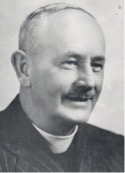JW Arthur, Missionary:
An Early Supporter of African Interests in Kenya
John William Arthur, born in 1881, a medical doctor trained in Glasgow, joined the Church of Scotland Mission in Kenya in 1906. He was posted to the Kikuyu mission, where he arrived on 1 January 1907, and soon decided that he should play a role in public affairs if he was to support the interests of the Africans. Particular points of controversy were Kikuyu land interests and the common Kikuyu practice of clitoridectomy. He sat on the Labour Commission of 1912-1913, but then the First World War broke out. Arthur busied himself organising the Kikuyu Mission Volunteer Carrier Corps of 1,900 men from among the adherents of his mission. After the war his involvement in public affairs led to him gradually abandoning medicine.

He sat on the Education Commission (1919) and on the Legislative Council (1924-1926) as ‘unofficial’ representative of African interests. He believed that “we are in a particular sense the trustees of the native peoples of the land and we must see that their interests are safeguarded and forwarded in the truest and best way possible. It is, further, impossible for us to dissociate ourselves as members of the British Empire and the Kingdom of God from the political life of the country.” He was on the Board of Governors of Alliance High School, as well as on several commissions which operated in Kenya in the 1920s and 1930s. He wrote numerous reports. Arthur recognised the colonial situation and context and thought the best way to proceed was to find a consensus of opinion between the missions, government and settlers.
The Legislative Council was, however, dominated by settler interests. Arthur faced much opposition, with many settlers openly hostile to missionaries, but he did have strong support from the new Alliance of Protestant Missions, which acquired a political function, and the later Kenya Missionary Council, which included Roman Catholics. Arthur was in favour of manual education for Africans, but he believed that education should go further and Africans should also be offered ‘literary education,’ which could provide an elite group which could progress gradually towards self-government. Essentially, he was in favour of the conservative policies of the Kikuyu Association, rather than the radical ideas of the East African Association of Harry Thuku. Arthur grew more conservative as he aged, and indeed to some extent reactionary.

The missionaries’ thinking was ambiguous.They supported African culture and development, but disliked tribal dances, prostitution, clitoridectomy and the establishment of separate African churches. But a Kikuyu nationalism was developing that wanted Africans to be responsible for choosing which traditional and modern elements were acceptable. Arthur also faced opposition from other missionaries. Archdeacon Owen dismissed the idea that a missionary could represent African interests: “Any missionary represents European Mission opinion and has no mandate for the Natives.” The Kikuyu Central Association started campaigning for the representation of African interests by Africans. A major source of conflict was the negative attitude of Arthur’s mission towards clitoridectomy. In 1928 the KCA announced their support of traditional customs, and stressed the importance of clitoridectomy as a central feature of initiation into Kikuyu adult society. But in 1920 the Kikuyu mission had expressly forbidden clitoridectomy for members of the church.
As a result, attendance at mission schools dropped dramatically. Arthur turned to the government for help. He had some success when in 1931 an ordinance was passed to make all extreme forms of clitoridectomy, with or without consent, a felony liable for a seven-year sentence. The result was that Arthur’s role as an advocate of African interests was compromised by the strident opposition of the Kikuyu leaders. The government, aware of this, asked him to resign from the Executive Council to which he had been appointed in 1928. His role as a middleman between African interests and a government subject to a powerful settler lobby, was over. It was a dilemma faced by all missionaries who were trying to introduce western Christian morality to traditional African societies. Arthur retired in 1937 and returned to Scotland, where he died in Edinburgh in 1952.

Recent Comments